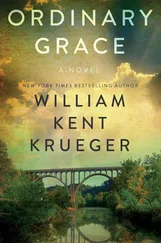“I’m at the Firststopotel, Cromwell Road.”
“I’ll be there in half an hour.”
♦
Alfredo Rilke only stayed in chain hotels — Marriott, Hilton, Schooner Inns, Novotel — but he always took an entire floor and however many rooms that floor contained. When he arrived, Ingram was shown up to the fifth floor and one of Alfredo’s youthful associates — a young man in jeans with an earpiece and a thin stick-microphone at his mouth — led him down a featureless corridor to one of the rooms and left him there with a smile and a small bow from the waist.
Alfredo Rilke opened the door himself before Ingram could knock. They embraced, diffidently, more a clasping of the upper arms and a leaning in to each other than anything else — their faces did not touch — Rilke patting him reassuringly on a shoulder blade and steering him into the dark room, curtains drawn.
Rilke was a tall, heavily built man in his early sixties, bespectacled, smiling, avuncular, bald with a neat semicircular ruff of unnaturally dark hair that started above one ear and circumnavigated the back of his head to the other. He moved slowly and deliberately as if he were on the verge of frailty. It was an illusion: Ingram had seen him playing energetic tennis in Grand Cayman and the US Virgin Islands, hitting the ball with real force. But off the tennis court he feigned this quasi-senility — a way of reassuring and disarming his colleagues, rivals and competitors, Ingram supposed. Alfredo Rilke seemed like a rapidly ageing man — exactly what he wanted people to think.
“Sit down, Ingram, sit down.”
Ingram did, noting that the bedroom had been converted, somewhat half-heartedly, into a sitting room — the bed pushed back to the side wall, some chairs and a coffee table added.
“Help yourself to a drink, Ingram,” Rilke said, opening the door of the mini-bar. “I have to make one phone call. I’ll be two minutes.”
Rilke went into the next-door room and Ingram poured himself a tonic water, and sat down, waiting. He knew a certain amount about Alfredo Rilke, but he always felt he knew only half of what he really should. He’d tried to find out more, had other people try on his behalf to find out more, but the story remained frustratingly the same, fundamentally unchanging, full of gaps and unanswered questions — over the years very little detail had been added to the Rilke biography.
Alfredo’s father, Gunther Rilke, had arrived in Uruguay (from Switzerland, by all accounts, though all that was very vague also) in 1946. He almost immediately married a Uruguayan, Asuncion Salgueiro, the only daughter of the owner of a small company producing fungicides and fertilisers, servicing the Latin American coffee industry. Alfredo was born in 1947 and his brother, Cesario, in 1950. Alfredo Rilke took over his father-in-law’s company in 1970, Cesario having died in a plane crash in 1969, and changed the name to Rilke Farmaceutico S.A.
He made his first fortune in the following decade with a cheap contraceptive pill and a powerful anti-depressant, surviving a series of lawsuits for patent infringement brought against him by Roche, Searle, Syntex and others.
Rilke himself left Uruguay and became permanently nonresident in 1982, choosing to live, henceforth, on board a series of large, regularly changed yachts that permanently cruised the Caribbean and the Gulf of Mexico, within easy two-hour reach of a dozen airports and the company jet. Rilke Pharmaceutical was born at that moment and a series of smaller pharmaceutical companies were steadily acquired in the USA, France and Italy. By the late 19905 Rilke Pharma was listed as one of the top ten pharmaceutical companies in the world.
And that was really about all he or anyone knew, Ingram thought, dissatisfied. Perhaps that was what happened when you lived ‘nowhere’ for a quarter of a century — you became very hard to pin down, in every sense of the expression. Except that the pharmaceutical world knew that patents on Rilke Pharma’s big drugs, the blockbusters, that provided the massive cash flow for the continued acquisitions — the oral contraceptive, an ACE inhibitor, a retroviral and a new series of’me-too’ anti-depressants — were all coming to the end of their licence period. Rilke Pharma needed a new blockbuster drug and that was when they had approached Calenture-Deutz and offered to invest heavily in the clinical trials and research of Zembla-4…
Ingram looked up as Rilke returned — he was apologising generously as he came through the door, carrying a file from which he spread documents on the coffee table. They were full-colour, mock-up, two-page advertorials. Each page had in bold type the message: ‘AN END TO ASTHMA?’. Ingram scanned through them: the usual bland advertorial pap—‘Renowned scientists in our research laboratories’; ‘The struggle to rid the world of this debilitating disease’—and pictures of serious-looking men in white coats peering into microscopes, holding up test tubes, healthy people enjoying enviable lifestyles on ranches and at the seaside. The pages concluded with heartfelt assurances of the continued fight against these chronic ailments (money no object) threatening the good life. It was all subtext. Here and there the name ‘Zembla-4’ cropped up. No claims were made, but the promise was vaguely implicit: just give us time, we and our handsome, white-coated scientists are working on it.
“Very impressive,” Ingram said, “but a little premature, no?” It had not escaped his notice that each advertisement featured the familiar logo: the red-circled, blue, scribbled ‘R’ of Rilke Pharmaceuticals. As far as Ingram was aware Calenture-Deutz still owned Zembla and all its derivatives, one through four. He decided to say nothing.
“You may be right,” Rilke said in his usual humble, non-confrontational manner. “It was just that Burton told me that Zembla-4 was close to ready. Third stage clinical trials complete. The documentation ready to be sent in to the PDA at Rockville…We’ve found in the past that an early, vague, very vague, advertorial campaign — with the usual brief-summary caveats, of course,” he pointed to a dense inch-thick footnote at the end of each advertorial page, “can make a significant difference. Everything seems to speed up, we’ve found.”
“Burton told you that, did he?” Ingram said, a little stiffly. “Actually, I wanted to talk to you about Keegan and de Freitas — I’d like them off the board.”
“That won’t be possible, I’m afraid, Ingram,” Rilke said, with an ingenue’s smile of apology.
It was at moments like these that Ingram found it helpful to remind himself that Alfredo Rilke had enriched the Fryzer family to the tune of some £100 million. It made bitter pills very easy to swallow. He changed his tone.
“It’s just that Keegan and de Freitas are assuming responsibilities no one gave them. It’s not in their remit to—”
Rilke held up his hand as if to say, forgive me, stop, please. “I asked them to assume these responsibilities after Philip Wang’s death. You know, Burton Keegan has supervised four, no five, successful new drug applications for Rilke Pharma. He’s the best: he knows exactly what he’s doing. There’s too much at stake here, Ingram.”
“Well, that’s a different matter. If I’d known—”
“How are things going on the investigation, by the way? Has Kindred been found?”
“Ah, no. Not yet. He seems to have disappeared off the face of the earth. The police have lost all trace of him. Baffling.”
“We don’t need to rely exclusively on the police, thank god,” Rilke said. What did he mean by that? Ingram wondered.
Ingram sighed. “We ran our reward-advertisements for two whole weeks. The police think Kindred may have killed himself…”
Читать дальше












